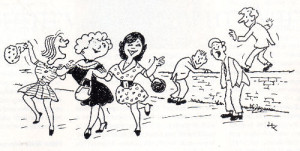 Life in a small Lancashire village just before the Second World War was a pretty mundane affair. As 14 and 15-year-old adolescents (there was nothing so trendy as teenagers in those days) we’d led fairly sheltered lives. We’d take a four or five-mile walk through fields, coppices and woods without any fears. Nobody in the village knew what a paedophile was, and wouldn’t have known how to spell it anyway!
Life in a small Lancashire village just before the Second World War was a pretty mundane affair. As 14 and 15-year-old adolescents (there was nothing so trendy as teenagers in those days) we’d led fairly sheltered lives. We’d take a four or five-mile walk through fields, coppices and woods without any fears. Nobody in the village knew what a paedophile was, and wouldn’t have known how to spell it anyway!
Youngsters of that era were well-versed in the lore of the countryside. We knew exactly where sticklebacks lurked in crystal-clear streams, and if asked the whereabouts of frog, toad or newt we could lead you to their haunts straight away.
A much wider variety of bird life was commonplace before chemical fertilisers and the grubbing-out of miles of hedgerows was a feature of ‘improved’ farming. We knew every one of these feathered species. We tracked down the nest of the song thrush by listening to the hammering sound it made while smashing open the shells of snails on its ‘anvil’ stone, and although we inspected the progress of up to half a dozen light blue speckled eggs, we were never tempted to vandalise them.
Magpies’ nests in straggly thorn bushes resulted in us looking like victims of the death of a thousand cuts when we investigated them. At the sight of a single magpie we recalled the ‘one for sorrow’ adage and resorted to the old country superstition of spitting three times over our right shoulder intoning: “Devil, devil, I defy thee!”
Climbing for the sheer fun of it was a pastime indulged in by most village lads, and in later years I shuddered when I looked at trees I’d shinned up effortlessly as a 14-year-old.
We dug for hay nuts and in the spring chewed the fresh new shoots of the hawthorn, known to us as ‘bread and cheese’.
Sap wasn’t just rising in wood and hedgerow. It was rising in the young males, and whether from ignorance or innocence we were unsure of how to deal with it, ‘it’ being a word that haunted us. We knew there was no chance of ‘it’ from the village girls who were our contemporaries.
One 17-year-old youth who cycled into Manchester on most weekends informed a group of wide-eyed village lads that ‘it’ was readily available there. Three of us vowed we’d test this theory, planning to walk the six miles or so to the city boundary and stroll ‘The Avenue’, the nearest of the Manchester outskirts. No public transport was available for the journey and none of us had ever been in a taxi, that being a prerogative of millionaires in our book. In any case, the thought of a 12-mile round trip didn’t daunt us.
As we chattered away the time passed quickly, and it was with feelings of trepidation that we entered what for us was a new world. A few hundred yards along the brightly-lit ‘Avenue’ we started to encounter groups of girls, arm in arm. Too shy to accost the first few lots, we discussed in whispers if they looked likely candidates for ‘it’.
A few minutes later three girls in short skirts and high heels, all puffing on Woodbines, came towards us. Emboldened by this sight, one of our number yelled: “Does your mother know you’re out?” (this phrase was reckoned to be the height of sophistication in our village).
It had the desired effect, and after much giggling we joined forces. Then came an eventuality we hadn’t bargained for – the heavens opened and we all scurried into the shelter of the large double doorway of as furniture shop. Here we paired off, and as I was the tallest of the group I found myself partnering Rene, who was my height and a big lass in every sense of the word. Feeling that ‘it’ was on the cards I reached out only to be repulsed by a hearty shove that nearly had me through the side window. “Take it easy” she grunted, and I brightened up, thinking that all was not lost. She closed her eyes and leaned her head back, which I took to be an invitation to kiss her. I was inured to farmyard smells, but the foul breath of a heavy smoker was something I hadn’t previously encountered.
Giving a heaving cough, I turned away in disgust, and seeing my expression she gave me an even harder push than before. Obviously the leader of her pack, she yelled: “Right you two, come on. We can do better than this lot!” The girls turned right, up the ‘Avenue’, and by common consent we turned left and headed for home.
Not much was said on the return journey, but our mothers had plenty to say when they saw our soaking Sunday suits.
‘It’ remained a mystery for some years for all of us, and when I did eventually solve it, you can be sure it was with a non-smoker.
Eric Clayton








